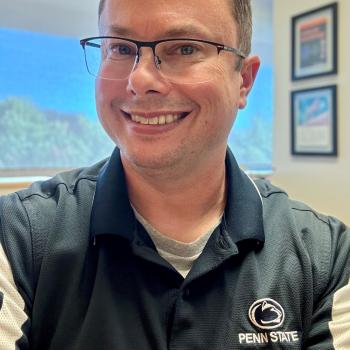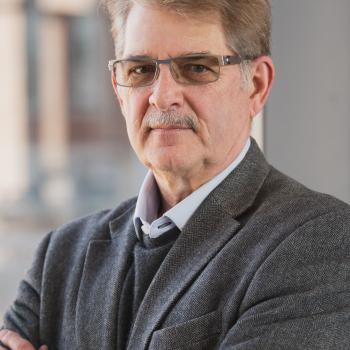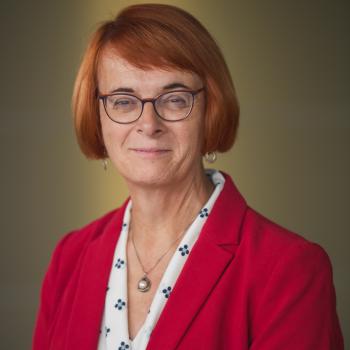Research
Departmental Research Areas
Full Listing of Departmental Faculty and Research Interests
Expand the list below to view a list of our faculty and their research interests
Dr. Armache's Research Interest: Mechanisms and functions of ATP-dependent chromatin remodeling
complexes and their place in genome regulation
Dr. Anand's Research Interest: Uncovering dynamics of cellular macromolecular assemblies.
Dr. Babitzke's Research Interest: Regulation of gene expression by RNA structure and RNA-binding
proteins.
Dr. Bai's Research Interest: Chromatin structure and its role in gene regulation
Dr. Bevilacqua's Research Interest: Attaining a molecular level understanding of RNA in biology.
Dr. Bisanz's Research Interest: The structure and function of the microbiome and
its impacts on health and disease.
Dr. Boal's Research Interest: The study of the structural differences between members of large
metalloenzyme superfamilies that share common features but promote different reactions
or use distinct cofactors.
Dr. Bollinger's Research Interest: The understanding of the relationship between the structures and
catalytic mechanisms of enzymes that employ such clusters, and to elucidate the biochemical
mechanisms by which the proteins acquire their clusters.
Dr. Booker's Research Interest: Elucidating the chemical mechanisms by which enzymes containing
iron-sulfur clusters catalyze chemical reactions.
Dr. Bryant's Research Interest: Genomics, structural and functional relationships, metabolism, physiology
and ecology of chlorophototrophic bacteria.
Dr. Cremer's Research Interest: The exploitation of linear and non-linear vibrational spectroscopies
to follow the interactions of ions with peptides, proteins, and macromolecules.
Dr. Ferry's Research Interest: The study the enzymology and molecular biology of anaerobic microbes
from the Archaea domain.
Dr. Gilmour's Research Interest: We use Drosophila as a model system for employing a multifaceted
approach to study mechanisms of transcriptional regulation.
Dr. Girirajan's Research Interest: Genetics of neurodevelopmental disorders.
Dr. Golbeck's Research Interest: Biophysical studies of electron transfer mechanisms in photosynthetic
prokaryotes.
Dr. Gu's Research Interest: The utilization of biochemical, molecular genetics, and spectroscopic
approaches to decipher mechanisms of cellulose biosynthesis.
Dr. Hanna-Rose's Research Interest: We use genetic and metabolomics approaches in C. elegans to
model inborn errors of metabolism and probe the molecular links between metabolic perturbations
and animal behavior and physiology.
Dr. Hardison's Research Interest: Epigenetic and genomic approaches for the systematic study of
eukaryotic gene regulation.
Dr. Jose's Research Interest: The understanding of the molecular mechanisms involved in the replication
and assembly of flaviviruses and alphaviruses.
Dr. Kao's Research Interest: We use Petunia inflata as a model to study biochemical, molecular, and
structural bases of a self/non-self recognition mechanism between pollen and pistil adopted by flowering
plants to prevent in breeding and promote outcrossing.
Dr. Krasilnikov's Research Interest: Structural biology of catalytic ribonucleoprotein complexes.
Dr. Kreb's Research Interest: The elucidation of the reaction mechanisms by which mono- and dinuclear
non-heme-iron enzymes activate dioxygen (O2) for a wide variety of oxidative transformations.
Dr. Lai's Research Interest: Growth Control and Cancer Genetics.
Dr. Lesk's Research Interest: Computational analysis of protein structure, function, genomics and
evolution.
Dr. Lindner's Research Interest: The coupling of molecular parasitology and structural biology to study
the malaria parasite.
Dr. Llinás' Research Interest: The combination of tools from functional genomics, molecular biology,
computational biology, biochemistry, and metabolomics to understand the fundamental molecular
mechanisms underlying the development of this parasite.
Dr. Lüscher's Research Interest: Molecular and cellular mechanisms underlying neuropsychiatric
disorders as well as mechanisms of antidepressant drug therapies.
Dr. Mahony's Research Interest: We build machine learning applications to understand how
transcription factors control cellular identity.
Dr. Melanie McReynolds' Research Interest: The understanding of the biochemistry behind aging,
and its intersection with stress, with the long-term goal of identifying strategies that promote healthier aging.
Dr. Medvedev's Research Interest: Developing computer science techniques for analysis of biological
data and on answering fundamental biological questions using such methods.
Dr. Meredith's Research Interest: Bacterial cell envelope biosynthesis.
Dr. Miyashiro's Research Interest: We use microbial genetics, biochemistry, and cell biology approaches
to determine the molecular mechanisms that enable bacteria to establish symbiosis with a eukaryotic
host. The model system is the symbiosis formed between the bioluminescent bacterium Vibrio fischeri and
the Hawaiian bobtail squid Euprymna scolopes. Our primary interests in this system include quorum
sensing,contact-dependent killing mechanisms, and sulfur metabolism.
Dr. Murakami's Research Interest: We apply cryo-EM and X-ray crystallography techniques to reveal
three-dimensional structures of DNA and RNA polymerases for elucidating the mechanisms of DNA
replication and RNA transcription.
Dr. Nekrutenko's Research Interest: Our lab is the birthplace of Galaxy. It is developed and maintained
together with our collaborators and worldwide community. We also work on a variety of topics related to
mutational dynamics and experimental evolution. We are also an integral part of the AnVIL project.
Dr. Okafor's Research Interest: The structural mechanisms of signaling and regulation in protein
complexes.
Dr. Patterson's Research Interest: Understanding the host-metabolite-microbiota communication
network‚ specifically how the manipulation of gut microbiota by diet and/or xenobiotics impacts host
metabolites (e.g., bile acids, short chain fatty acids), their metabolism, and how these co-metabolites
interact with host ligand-activated transcription factors.
Dr. Paulson's Research Interest: The mechanism of tissue regeneration using the response to anemia
as a model system.
Dr. Perdew's Research Interest: The biochemical pathway of AHR activation and characterized species
difference in AHR mediated transcriptional activation of target genes.
Dr. Peter's Research Interest: The role of the peroxisome proliferator-activated receptors (PPARs) in the
regulation of homeostasis, toxicology and carcinogenesis.
Dr. Reese's Research Interest: Stress-induced gene expression and UV resistance pathways, Regulation
of mRNAs from birth to death during stress responses, Targeted protein degradation during
transcriptional stress and How RNA Polymerase II contends with barriers throughout the genome.
Dr. Rolls' Research Interest: The Rolls lab aims to understand how neurons generate axons and
dendrites with different microtubule organization, and how neurons respond to injury. Current projects
focus on mechanisms that control microtubule polarity and dynamics and mechanisms that promote
neuronal regeneration.
Dr. Roy's Research Interest: Forensic DNA analysis using massively parallel sequencing and short
tandem repeat technology, trace evidence, fingerprints.
Dr. Santy's Research Interest: We study the signal transduction and vesicular trafficking processes that
promote migration in epithelial cells. We seek to understand the role of these processes in normal
homeostasis and in pathological processes.
Dr. Selleck's Research Interest: Nervous system development and molecular mechanisms of
neurodegenerative disorders.
Dr. Showalter's Research Interest: The use of solution nuclear magnetic resonance (NMR) spectroscopy,
in combination with thermodynamic analysis, chemical biology, and cellular assays to advance
understanding of protein function.
Dr. Szpara's Research Interest: Understanding the consequences of HSV latency for the neurons that
harbor the HSV pathogen and the search for improved therapeutics using a combination of virology,
neurobiology, next generation sequencing technologies, and bioinformatics.
Dr. Tan's Research Interest: The understanding of how genes are regulated by combining genetic,
biochemical and structural descriptions.
Dr. Thomas' Research Interest: The role of the cortical actin cytoskeleton in cell polarity and
morphogenesis.
Dr. Weinert's Research Interest: The understanding of how the globin coupled sensor protein family
senses oxygen and transmits the binding signal into downstream events.
Dr. Yennewar's Research Interest: Elucidating molecular structures relevant to chemists, biochemists,
material scientists etc. and educating graduate students embarking in these fields, the technique of X-ray
diffraction (crystal growth, data collection and structure solution and refinement, and interpretation).
The Department supports a consortium of academic teams that cuts across various research areas. The Biochemistry and Molecular Biology Department engages in an unsurpassed variety of research within the life sciences maintaining its deep and longstanding commitment to integrative, interdisciplinary team-building, and culture of deep collaboration, producing extraordinary outcomes. Discover the Centers and Facilities the Faculty in the Department utilize each and every day to further their research.

Departmental Training Grants
 |
Eukaryotic Gene Regulation Postdoctoral Training ProgramThis NIH-sponsored Training Program prepares young scientists to excel in both experimental and computational approaches to address fundamental questions in gene regulation. |
Biomedical Big Data to Knowledge (B2D2K)This NIH-sponsored Training Program comprises a diverse cohort of next-generation scientists engaged in integrative analyses of biomedical data to advance science and improve health. |
 |


















































